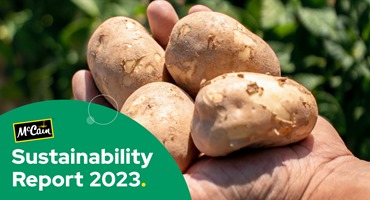By: Farms.com
McCain Foods has released its 2023 Global Sustainability Report, marking significant progress towards its goal of implementing 100% regenerative agriculture by the decade's end. With over half of its global potato acreage now embracing this innovative approach, McCain's efforts are reshaping the agricultural landscape.
Max Koeune, President and CEO of McCain Foods, emphasizes sustainability as the core of their business, crucial for combating climate change effects. McCain's commitment extends beyond farming practices, focusing on resource-efficient operations and community engagement.
Key initiatives include the Farm of the Future projects in Canada and Africa, where regenerative agriculture is actively demonstrated and tested. These efforts have led to improved water-use efficiency, particularly in water-stressed regions, and the development of water stress-tolerant potato varieties.

Significantly, McCain has achieved a 9.8% reduction in absolute carbon emissions since 2017, with over 21% of its electrical energy coming from renewable sources. The company has also made notable advances in packaging recyclability, with a high percentage of its paper and plastic packaging now designed for recycling.
In the realm of product quality, McCain has launched global policies focusing on clean ingredients and nutrition while maintaining high safety standards across its facilities. These efforts include reducing sodium in appetizer products and eliminating artificial ingredients from key items.
Community involvement is another pillar of McCain's strategy. Through the McCain Chips In initiative, employees have contributed over 17,000 volunteer hours, supporting various development programs and donating millions of meals.
As McCain Foods continues to lead the charge in sustainable food production, their collaborative approach with farmers, governments, NGOs, and other stakeholders underlines a collective journey towards a resilient, planet-friendly food system. This Canadian family-owned business, with a global footprint, is setting a precedent in the agri-food sector, balancing economic success with environmental responsibility.
“While we are proud of how far we have progressed towards our goals, we recognize there is more to be done,” says Mr. Koeune. “But we know this is not something we can do alone. Partnership and knowledge are crucial to move forward. We will continue to look to stakeholders – from our farmers, to government, to financial institutions, NGOs, suppliers, customers and other players in the food system – to collaborate on this journey towards planet-friendly food.
Read McCain’s 2023 Global Sustainability Summary Report and all associated downloadable assets here.